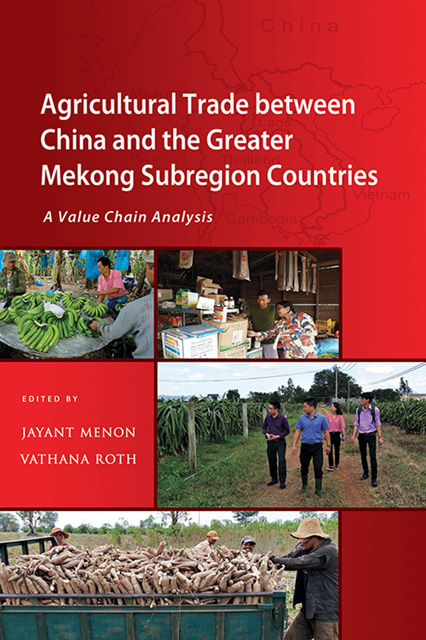Book contents
- Frontmatter
- Contents
- List of Tables
- List of Figures
- List of Annexes
- Foreword
- Preface
- Acknowledgements
- Abbreviations and Acronyms
- The Contributors
- 1 Agricultural Trade between China and the Greater Mekong Subregion Countries: An Overview
- 2 Economic Structural Change in China and the Implications for Agricultural Trade in the Lancang-Mekong Region
- 3 Agricultural Exports from Thailand to China: A Value Chain Analysis of Cassava and Durian
- 4 Agricultural Exports from Cambodia to China: A Value Chain Analysis of Cassava and Sugarcane
- 5 Agricultural Exports from Laos to China: A Value Chain Analysis of Rice and Cavendish Banana
- 6 Agricultural Exports from Myanmar to China: A Value Chain Analysis of Maize
- 7 Agricultural Exports from Vietnam to China: A Value Chain Analysis of Dragon Fruit and Coffee
- Index
3 - Agricultural Exports from Thailand to China: A Value Chain Analysis of Cassava and Durian
Published online by Cambridge University Press: 30 June 2023
- Frontmatter
- Contents
- List of Tables
- List of Figures
- List of Annexes
- Foreword
- Preface
- Acknowledgements
- Abbreviations and Acronyms
- The Contributors
- 1 Agricultural Trade between China and the Greater Mekong Subregion Countries: An Overview
- 2 Economic Structural Change in China and the Implications for Agricultural Trade in the Lancang-Mekong Region
- 3 Agricultural Exports from Thailand to China: A Value Chain Analysis of Cassava and Durian
- 4 Agricultural Exports from Cambodia to China: A Value Chain Analysis of Cassava and Sugarcane
- 5 Agricultural Exports from Laos to China: A Value Chain Analysis of Rice and Cavendish Banana
- 6 Agricultural Exports from Myanmar to China: A Value Chain Analysis of Maize
- 7 Agricultural Exports from Vietnam to China: A Value Chain Analysis of Dragon Fruit and Coffee
- Index
Summary
INTRODUCTION
China’s dramatic transformation on both domestic and international fronts is redirecting not only its own but also the world economy. China’s push to position itself as a key global economic leader and to strengthen its influence in Asia is increasingly visible through various cooperation schemes such as the Greater Mekong Subregion Programme, the ASEAN-China Free Trade Area and the Regional Comprehensive Economic Partnership. China has become the primary export destination as well as the biggest source of imports for many countries in the region. Importantly, China’s growing purchasing power and sustained rapid expansion present vast opportunities for Thailand to expand its trade with China.
Indeed, Thailand’s trade with China has grown markedly in the past two decades. The value of Thailand’s exports to China increased from around US$1.7 billion in 1998 to almost US$30 billion in 2017, about 20 per cent of which was accounted for by agricultural exports. Further, the share of agricultural exports in total exports to China is the highest among major markets such as ASEAN, the European Union and the United States. Thailand’s agricultural exports to China are concentrated in only a few products, however. In particular, exports of cassava and durian to China have grown steadily over the past years, which is why they were selected for value chain analysis.
Despite the rise in agricultural exports to China, Thai exporters still face various non-tariff measures (NTMs) from China. Thai jasmine rice exporters, for example, face quota restrictions and other sanitary and phytosanitary (SPS) requirements (Phanishsarn 2018). Longan exporters must also comply with SPS measures, which require longan growers to have at least good agricultural practices certification (Hasachoo and Kalaya 2013). While many NTMs are in place to protect human and animal health, some are seen as discriminatory measures to restrict trade. Understanding the NTMs facing actors in agricultural value chains is important for boosting agricultural exports to China.
This chapter analyses durian and cassava value chains in Thailand and identifies challenges for stakeholders at different stages of the chains. The study also reviews NTMs imposed by both Thailand and China on durian and cassava exports. Various types of information were collected from desk research as well as focus group discussions and key informant interviews.
- Type
- Chapter
- Information
- Agricultural Trade between China and the Greater Mekong Subregion CountriesA Value Chain Analysis, pp. 59 - 107Publisher: ISEAS–Yusof Ishak InstitutePrint publication year: 2022

